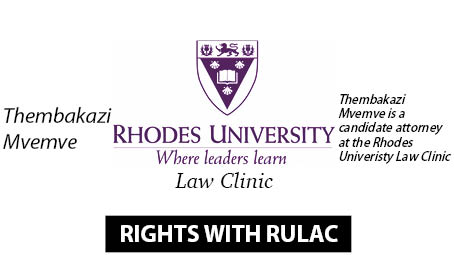DRAW UP YOUR WILL FOR FREE
The Rhodes University Law Clinic will be participating in National Wills Week, which runs from 17-21 September 2018. During this time, the Clinic will draft free basic wills for any member of the public. Should you wish to have a will drafted, please contact the Clinic’s reception (046 603 7656) before or during National Wills Week to make an appointment to consult. Please note that capacity is limited, and so clients will be assisted on a first-come, first-served basis.
By Shaun Bergover
WHAT IS A WILL?
A Will is a legal document expressing your wishes as to how you want your property to be distributed following your death. It is an important part of estate planning. The only way in which the law will recognise your intentions of what should happen to your estate, is if your intentions and wishes are documented in writing in the form of a Will. Should you fail to prepare a valid Will prior to your death, you will be said to have died intestate, and the laws of intestate succession will determine how your estate is divided. If, however, you leave behind a valid Will, you are considered to have died testate, and your estate will be distributed according to your wishes.
CAPACITY TO MAKE A WILL
The capacity to make a Will is known as testamentary capacity. The Wills Act 7 of 1953 specifies that the person drawing up the Will must be:
- At least 16 years of age; and
- Mentally capable of understanding the nature and effect of his act at the time of making the Will.
Wills are mostly disputed on the issue of mental capacity. The person alleging that the testator lacked mental capacity to execute a Will has to prove this. This normally involves evidence from a medical practitioner. The person alleging invalidity has to first approach the Master of the High Court. If the Master accepts the Will as valid, a dissatisfied party will have to approach the High Court.
LEGAL REQUIREMENTS TO MAKE A WILL IN TERMS OF THE WILLS ACT 7 OF 1953
- The Will must be in writing.
- The Testator must sign the will in the presence of two witnesses.
- The Will must be signed by the testator at the end and must be signed (or at least initialled) on each page too.
- When the testator cannot write or sign for him/herself, the Will can be ‘signed’ before a Commissioner of Oaths using a thumb print.
WHO CAN INHERIT IN TERMS OF A WILL?
- Unborn children
- Adopted and extra-marital children
- A class or group of people
CONTENTS OF A WILL
- Personal details of the Testator: The Testator must be clearly identified. A Will must include his/her full names, identify number and address at the time of drafting the Will.
- Revocation clause: The Testator must cancel or deem invalid any other Will made previously to the present one.
- Appointment of the executor: The executor is the person entrusted to carry out the last wishes of the testator.
- Bequest: This is the part of the Will where the Testator leaves his/her property to chosen beneficiaries.
- Funeral Instructions: The Testator may wish to specify details pertaining to the funeral.
- General Clauses: An example of a general clause is the exclusion of certain marital regimes from a bequest to the Testator’s heirs. This means that any benefit given according to the Will cannot be included as part of the beneficiaries’ joint estate in a marriage in community of property or as part of the accrual in a marriage out of community of property. This is done to protect the benefit should the Testator’s heir go through a divorce.
- Signature: It is important that the Testator signs the Will and initials every page alongside two witnesses.
- Date: A Will must be dated. This is necessary to distinguish different Wills and to establish which Will was the last one written by the Testator.
REMEMBER TO KEEP IMPORTANT DOCUMENTS SAFE. EXAMPLES OF IMPORTANT DOCUMENTS ARE:
- Title deeds to any property/ies the testator owns.
- Bank statements.
- Policy documents (investments and life insurance policies)
- Vehicle registration documents
- Clothing and furniture account records
RHODES UNIVERSITY LAW CLINIC HELPING YOU
The Rhodes University Law Clinic strives to improve access to justice through the provision of free legal services to indigent people in most areas of law. In addition to its New Street offices, Law Clinic staff are available to clients at the Assumption Development Centre (Konongendi), Nceme Street, Joza, every Thursday from 9am-12pm.
The Law Clinic also provides monthly workshops on a wide range of topics in order to raise awareness of people’s rights. The workshops are conducted by staff of the Rhodes University Law Clinic at various locations around Grahamstown. For more detail, please contact the Assumption Development Centre (Konongendi) or the Rhodes Law Clinic:
Rhodes University Law Clinic
Telephone 046 603 7656
lawclinic@ru.ac.za


